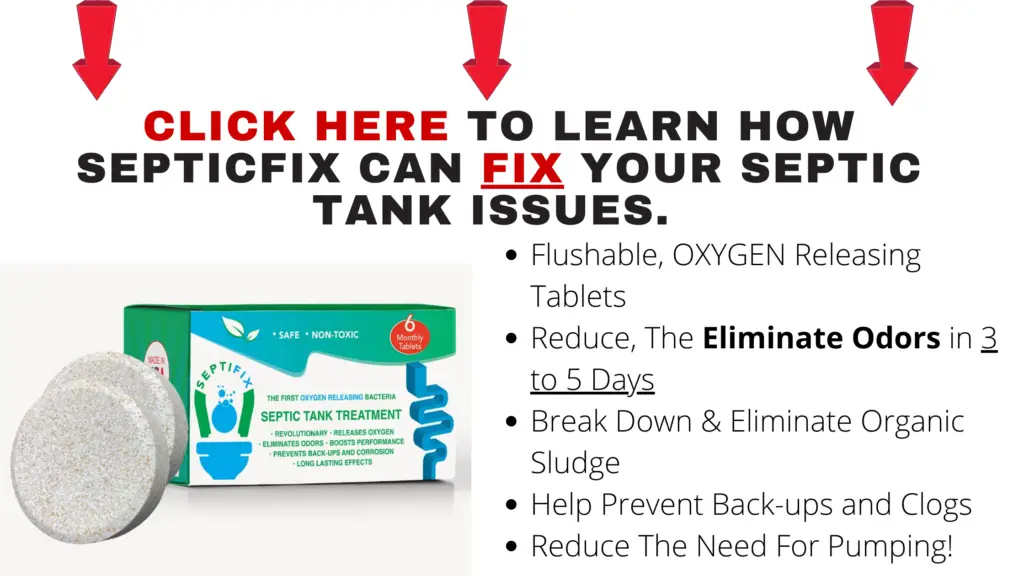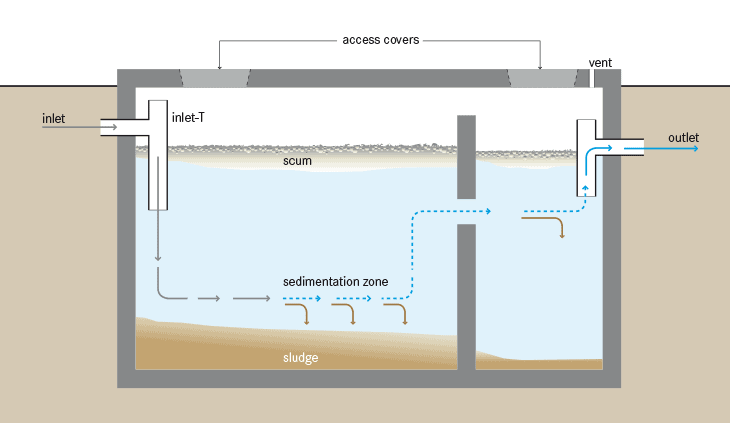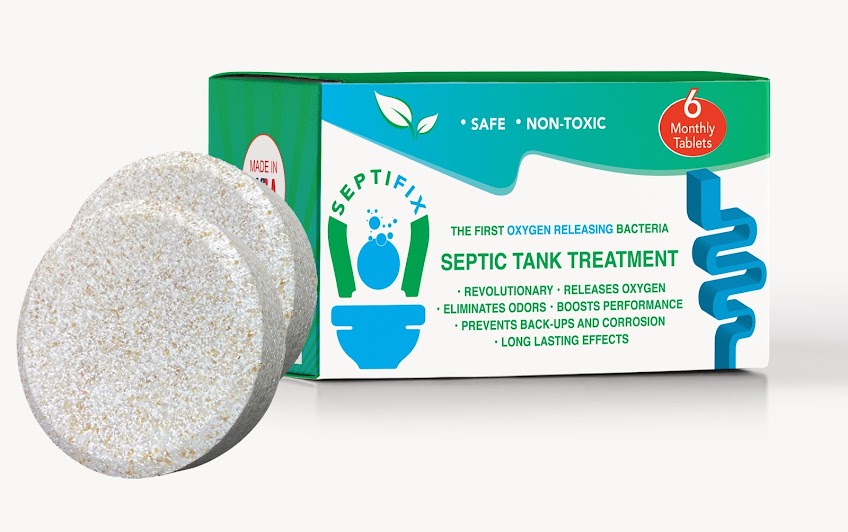Best Flushable Wipes For Septic Tanks
A septic system is a crucial element of any property. In this article, we explore the best flushable wipes for a septic system.
Sewage is the last thing anybody wants to be worrying about on a day-to-day basis, and so a healthy on-site wastewater treatment system is vital unless we want to reside in an unsanitary environment. If you agree that a well-functioning septic system is invaluable, then you should agree that flushing just about anything down your toilets and drains would be irresponsible.
Unmindful disposal of wastes runs the risk of damaging septic tanks and city wastewater treatment units, as well as unwelcome contributions to environmental pollution. It should come as no surprise that improper septic system maintenance can cause wastewater that’s been inadequately treated to drain into your well, yard, and surface water – all posing significant health and environmental problems for you and everyone else.
A malfunctioning septic system can release viruses, bacteria, and toxic chemicals to local waterways and into the ground, streams, lakes, rivers, and more, which can harm local ecosystems and kill wildlife. Similarly, a neglected septic tank can lead to sewage, not to mention all the bacteria that thrive in it, backing up into your home or building. If you want to help break down clogs and waste in your septic tank you may want to consider a product like SeptiFix, you can read our full SeptiFix review here. Or visit their site by clicking the image below.

Are flushable wipes safe to use with septic systems? Wipes have many uses and are truly helpful, especially when you’re on the go. Not so long ago, wipes were only disposable. Fortunately for us, there now are flushable wipes that are made with special fibers that render them suitable for sewage systems and septic tanks. There are several companies that manufacture flushable wipes, and unsurprisingly, many of them are big names in the toilet paper industry.
What you don’t want to end up in your septic tanks are non-biodegradable wastes such as diapers, cigarette butts, coffee grounds, and the like. That’s right, things that slowly decompose or don’t get flushed down drains completely. The bacteria in the septic tank are unable to break those down. Solid matter that are not decomposed end up settling to the bottom of the septic tank and turn into a semi-solid sludge layer. A septic professional will need to periodically pump this layer and haul it away. Adult and baby wipes have become wildly popular over the years, however, these often clog sewage pipes and cause back-ups. Some brands in the market may argue that their wipes are flushable. These are the only kinds that you should patronize. However, as with all things labeled as “flushable”, remember that just because the wipes can pass through your toilet doesn’t mean your septic tank will be able to break these down. If you use wet wipes, your best bet would be to throw them in the trash to avoid clogging and other plumbing difficulties.
There are, however, reliable flushable wipes brands out there. The kind that do break down quickly after getting flushed down the toilet. This is excellent for the environment as it doesn’t take too long to decompose, unlike the more conventional non-flushable wipes.
The best flushable wipes are not just those labeled as manufactured with “safe-to-flush” technology. Looking for the best flushable wipes for a septic system is also about choosing the wipes that will not harm or irritate your skin and the one to trust are those labeled as “alcohol-free“. You might also want to consider those that are perfume-free, dye-free, hypoallergenic, and well-moisturized. Looking at the factors that make flushable wipes suitable for septic systems, we likewise looked for elements that will make them safe for your everyday use and for our environment.
#1 Medline Readyflush Protect Flushable Personal Cleansing Cloths
Medline’s Readyflush is flushable and dispersible moistened cleaning wipe made from hydras pun dispersible cloth fibers. Each wipe is pre-moistened with a rinse-free formula that cleans, moisturizes and soothes the skin. Medline Readyflush is made with fibers that break down quickly when flushed, yet are strong when in use. Medline Readyflush is guaranteed biodegradable.
PRO: Users love Medline for its larger-size wipes. You get more cleaned up for significantly less. Medline Readyflush is also recommended for sensitive skin.
CON: A few users find Medline Readyflush to be a bit pricier than typical brands of its category.
#2 Swipes Lovin All-Natural Intimate Feminine Wipes
Swipes Lovin All-Natural Intimate Feminine Wipes are made with fibers that are 100% derived from sustainable resources, Each Wipe is dispensed from packaging built with Rigid Lens Hinge using 70% less plastic. Its convenient and well-designed packaging goes a long way in preventing Swipes Lovin from drying up. Swipes Lovin is made with the softest eco-friendly ingredients. It is pH-balanced, alcohol-free, chlorine-free, paraben-free, and dye-free, making it a perfect choice for women’s sensitive parts. Swipes Lovin is biodegradable, compostable, flushable and dispersible, making it safe for sewer and septic systems.
PRO: No harsh chemicals were used in the production of Swipes Lovin All-Natural Intimate Feminine Wipes. It leaves no soapy residue and no lingering smell of alcohol.
CON: Some users find Swipes to be small and flimsy, that you might need more than one wipe to get the job done.
#3 Dude Wipes Flushable Wet Wipes
Dude Wipes are 25% larger than your average flushable wet wipes. Dude Wipes come unscented, formulated with naturally soothing aloe vera and vitamin E to protect your sensitive sides. Dude Wipes are made from innovative and sustainable flushable wipe materials, derived from plant-sourced fibers.
PRO: Dude Wipes come in a much better size and scent than other wet wipes options in the market. Doused with soothing vitamin E and aloe to protect every dude’s backside.
CON: A few users find Dude Wipes Flushable Wet Wipes to be a little on the thin side. This makes a few dissatisfied users think of it as “expensive toilet paper”.
Scott Flushable Wipes provide you and your family with a quality clean at a value you’ll surely love. Scott Flushable Wipes are fragrance-free and hypoallergenic, making it real gentle on the skin. Made from 100% plant-sourced fibers, Scott Flushable Wipes are alcohol-free and dye-free. Manufactured with SafeFlush Technology, Scott Flushable Wipes immediately start to break down after flushing and are sewer and septic safe.
PRO: Scott Flushable Wipes are conveniently packaged in easy-to-use pop-up tubs. Place one in every bathroom in the home and keep Scott Flushable Wipes within easy reach of all family members and your guests.
CON: Scott Flushable Wipes are thin and may tear easily, some unhappy customers have observed. The smaller-sized wipes may mean that you need to use more wipes to get cleaned up.
#5 Cottonelle GentlePlus Flushable Wet Wipes
Cottonelle GentlePlus Flushable Wet Wipes are a consumer favorite for giving superior clean that’s fresh, gentle, and effective. Cottonelle GentlePlus features the breakthrough CleanRipple Texture that Cottonelle is known for, providing you with a soft, strong, and effective clean. Cottonelle GentlePlus has large, dual layers to help clean better versus regular toilet paper alone. Cottonelle GentlePlus Flushable Wipes are truly flushable and start to break down immediately after flushing. Made of cellulose fibers that are 100% biodegradable. Cottonelle GentlePlus Flushable Wet Wipes are sewer and septic-safe.
PRO: Cottonelle Wipes are flushable based on INDA flushability guidelines. Each Cottonelle GentlePlus sheet offers a fresh, gentle and effective clean.
CON: There is a bit of a fragrance and so may not be as hypoallergenic as needed by all sensitive-skinned users.
#6 Pampers Kandoo Flushable Baby Wipes
Pampers Kandoo Flushable Baby Wipes are easy to use, perfect for little hands, and will clean up to 30% better than regular toilet paper. Each Pampers Kandoo Flushable Baby Wipe is moistened with lotion to be extra soft, is hypoallergenic and do not contain drying alcohols, parabens or sulfates. This absence of harsh chemicals means your baby gets effective and safe cleaning even in the most sensitive areas. Pampers Kandoo Flushable Baby Wipes are flush-friendly and biodegradable.
PRO: Pampers Kandoo wipes are easy to use for all ages. Each sheet’s handy size promotes independent wiping and cleaning, especially in the growing-up years.
CON: Label indicates a disclaimer to flush only one or two wipes at a time and to use only in well-maintained toilets, drain lines, sewer lines, and septic systems.
Litewipes Flushable Wipes features a new herbal formula with soothing natural extracts. Each sheet contains a soothing blend of aloe, cucumber, and chamomile extracts. Litewipes Flushable Wipes are alcohol, oil, fragrance, and paraben-free. It’s a perfect choice for sensitive skin, from babies to adults. Litewipes is made with plant-based biodegradable and flushable fabric.
PRO: Litewipes Flushable Wipes come in a compact packaging, small enough to easily fit in a wallet or purse. Litewipes is always great to have on-the-go.
CON: Litewipes has been observed by users to be insufficiently moistened. It is uncertain if it is because of packaging (or not) which is unable to preserve the wipes’ desired moisture.
#8 SweetSpot Labs Natural On-the-Go Wipes
SweetSpot Labs On-The-Go Feminine Wipes in Coconut Lime are 98% natural and pH-balanced for every female’s sweet spot, as well as the whole body. Natural ingredients give SweetSpot Labs Wipes a refreshingly exotic, tropical citrus scent. It is formulated free from glycerin, sulfates, alcohol, parabens, MIT preservatives, phthalates, gluten, soy or dairy ingredients. Clinically- and gynecologist-tested, SweetSpot Labs Natural On-the-Go Wipes are guaranteed safe for sensitive skin. FSC-certified, biodegradable, and compostable.
PRO: SweetSpot Labs has a pH-balanced formulation that’s perfect for women’s natural chemistry. Formulated with just a touch of scent to give an aroma without leaving any irritation.
CON: Some users were unhappy with the “un-natural” scent. Some find the smell to be synthetic and unpleasant.
#9 Tena UltraFlush Flushable Washcloths
Tena Flushable Washcloths are made with a moisturizing 3-in-1 formula that gently cleans, protects and leaves skin feeling moisturized and refreshed. Its formulation is alcohol-free and manufactured to be over 99% biodegradable. Sewer and septic safe, Tena Flushable Washcloths will not clog pipes when used as directed.
PRO: Each wipe is 7.5 x 12.6 in big and are perfect for “in-between-showers” cleaning. It has a very light clean smell perfect for sensitive users.
CON: The large washcloths may tear easily.
#10 Medline NatureSoft Flushable Dry Wipes
Medline NatureSoft Flushable Dry Wipes are sturdy flushable wipes that are gentle to the touch but tough enough for all cleansing needs. These flushable dry wipes from Medline NatureSoft are soft and absorbent. It features a plumbing-safe design that doesn’t contribute to clogging, entanglement and obstruction in your plumbing. Medline NatureSoft is biodegradable and safe to use with septic tank systems.
PRO: You get more for less with Medline NatureSoft Flushable Dry Wipes’ larger wipe size of 9″ x 13” per sheet.
CON: Users use these dry wipes and just moisten them with tap water or disinfectant fluids. Depends on the wetting agent you use, these dry wipes may fall apart upon moistening.
What NOT to Flush Down Toilets
When appropriately and regularly maintained, your septic system should not give you any headaches. You can save on expensive septic tank and system repairs by knowing what you should and should not be allowing into your septic tanks. Most people don’t think about these things until they experience complicated clogs and septic tank problems that require professional repair work. We’ve listed some of the most common clogging agents that you should really avoid flushing down your toilets and drains.
Diapers. Sure, diapers contain human waste, but this does not make them suitable for flushing down toilets. Diapers are designed to expand in water. In the unlikely case you actually get the diaper to flush down a toilet, it will likely just get caught in the U-bend of your sewer pipe and cause blockage.
Feminine Products. Tampons, sanitary napkins, and other feminine products are some of the most common items flushed down toilets. Do know that these items are not easily (if at all) broken down inside septic tanks, leaving them sitting at the bottom of the tank. Eventually, the accumulation of such items will leading to clogs or even the back-flowing of septic tank effluent or sewage.
Dental Floss. Dental floss is so fine and small that you might think that it’s fine to just dump it down a toilet. But dental floss does not break down, meaning that the one little strand that you flush every day can add up to one huge problem. Along with the other non-biodegradable items in your septic tank like hair, feminine products, and others, dental floss can add up to septic tank clogs or damage.
Cotton balls, buds, and tips. These items, much like the previous items on this list, cannot be broken down by bacterial action over time. It’s the accumulation of items like this that can clog your septic system, which can lead to flooding and back-ups. Additionally, these cotton items will soak up the liquids in your tank, resulting to an overworked system and more frequent pumping is required.
Fats, oils, and grease. If you don’t already know, grease should never be poured down any drain. Although it may appear to be a liquid that could easily be dumped down a drain, when fats, oils, or grease cools, it will congeal and clog up pipes. It is advised that you collect grease in a glass jar and throw it away with the trash.
Cigarette butts and filters. These cigarette stumps are non-biodegradable and will not be digested inside septic tanks. Moreover, cigarette butts can be quite damaging to the bacterial balance in your tank. These inorganic agents can likewise contaminate groundwater, making it unsafe to drink and unhealthy for the ecosystem.
Medicines and other chemicals. If pills or other medication expires or if you’re left with an excess upon the end of a prescription, don’t flush these down your toilet. They can impact the bacterial ecosystem inside the septic tank, which may result to the microbes’ inability to digest or break down waste and pathogens. The same is true for harsh chemicals such as toxic cleaning agents, paint, paint thinners, etc. Additionally, releasing potent and toxic substances into your septic system can result in them seeping into the groundwater, polluting and damaging the environment.
The only things that should get flushed down toilets are biological wastes and septic-safe toilet paper. Nothing else. Apart from grey and blackwater, it is vital that you allow only septic-safe products (as indicated on the label) down your toilets and drains. Many common household products bear these septic-safe labels, so choose wisely. Remember that biodegradable or environmentally-friendly products are likewise perfectly safe for use if what you have is an on-site septic system.
Signs that Your Septic Tank is Full
For septic systems to function properly and last for many years, septic tanks must be regularly pumped. A good average is to have your septic tank pumped once every 3 to 5 years. This will vary depending on several factors (such as size of household, tank size, etc.) As basic reference, some signs that it’s time to have your septic tank pumped out include:
Pooling water. If you notice pools of water around your septic drainfield and/or where your septic tank is buried, this could indicate an overflowing of effluent, especially if it hasn’t been raining in your location. When it reaches capacity, the solid wastes in your tank can clog the drainfield piping and force liquid to the surface. Definitely call for a professional inspection upon observing this.
Foul odors. Along with waste, your septic tank collects greywater from dishwashing, showering, and laundry. As the septic tank fills up, odor-causing gasses can start emanating from your drains, toilets, drainfield or area of your septic tank. If you start to notice strange odors both inside and around your property, it could mean your septic tank is full and is in need of pumping.
Sewage back-up. A full septic tank can result in a sewage backing up into your home through your toilets, sinks, and drains. Upon the first signs of sewage traveling back up your sewer line, the last thing you want to do is wait for the sewage to begin flooding inside your house or building, rendering it completely unsafe and uninhabitable.
Slow drains. If you notice slow draining in sinks and tubs and if your toilet seems to be flushing very slowly, even after you’ve run your plungers to unclog them, this could mean you have a full septic tank. Time to call for a professional inspection.
Gurgling sounds. Another indication that you have a septic tank that’s at (or critically near) capacity is if you hear gurgling sounds coming from your drains, toilets, or anywhere throughout your plumbing. You should definitely contact your trusted septic professional to come in and inspect the source (or sources) of the gurgling sounds.
Lush vegetation. If your lawn (or a patch of it) is uncharacteristically lush or green, most particularly around the drainfield and/or septic tank area, it could be a sign of a full septic tank that’s in need of immediate pumping.
If you want unproblematic plumbing throughout your home or building, septic tank system maintenance is a necessity. A neglected septic system can lead to major clogs, sewage back-ups and even flooding of effluent or untreated wastewater. Routine septic system service is an investment towards safety and peace of mind.
Toilet paper is generally tolerated by septic and sewer systems because it is made primarily of light cotton material, causing virtually instant disintegration upon contact with water. This does not mean we should all just fall into complacence, though. If you have come to rely on wet wipes for daily cleansing practices, do know that such wipes are typically made with plastic fibers that make them significantly sturdier than regular toilet paper. Just think about it this way: if they are strong when used, they are likely to stay strong when flushed down toilets and traveling through to your septic tank or to your community’s sewer system. A number of septic experts recommend not flushing wipes down toilets at all. Just because they can be flushed does not entirely mean they can be broken down. But if wipes have become an essential part of your daily living, make it a point to stick to wipes available the market that are labeled as “septic-safe” and nothing else. Knowing the basics of how a septic tank and septic system work is essential in identifying and even avoiding problems down the line.
https://www.amazon.com/slp/septic-safe-flushable-wipes/uwz8pvgcgw7n9q3
https://www.wisebread.com/the-5-best-flushable-wipes
https://www.canr.msu.edu/news/are_flushable_bathroom_products_safe_for_sewer_and_septic_systems
https://www.pristinesprays.com/blogs/news/septic-tank-service
https://blog.adbseptic.com/blog/10-things-you-cant-flush-down-the-toilet-with-a-septic-system
https://blog.adbseptic.com/blog/5-common-septic-system-problems









